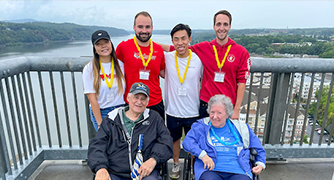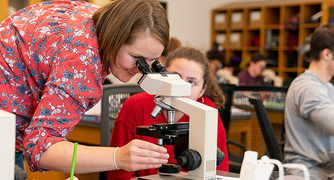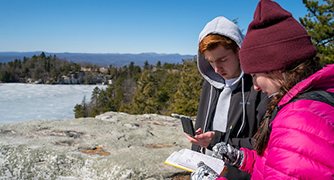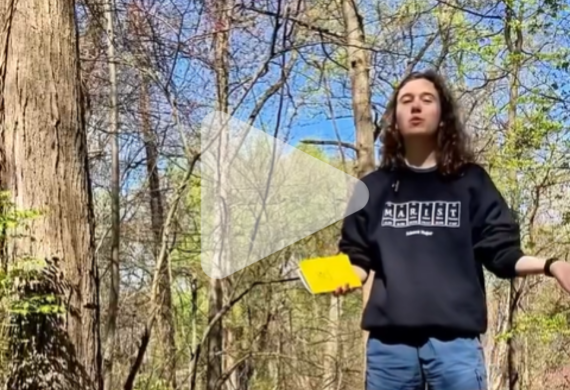-
About
Admitted Student Days
• Saturday, March 28
• Sunday, March 29
• Saturday, April 11Accepted Students: Be sure to register for one of our Admitted Student Days and explore all that Marist has to offer.
About
-
Academics
Admitted Student Days
• Saturday, March 28
• Sunday, March 29
• Saturday, April 11Accepted Students: Be sure to register for one of our Admitted Student Days and explore all that Marist has to offer.
Academics
-
Admission & Financial Aid
Admitted Student Days
• Saturday, March 28
• Sunday, March 29
• Saturday, April 11Accepted Students: Be sure to register for one of our Admitted Student Days and explore all that Marist has to offer.
Admission & Financial Aid
-
Student Life
Admitted Student Days
• Saturday, March 28
• Sunday, March 29
• Saturday, April 11Accepted Students: Be sure to register for one of our Admitted Student Days and explore all that Marist has to offer.
Student Life
- Athletics
Students listening to the lecture.
School of Science
Experiential Learning
An integral part of the Marist experience, experiential learning emboldens students in various environments, including labs, on campus, in professional settings, and around the world. Through immersive opportunities such as research projects, study abroad programs, community engagement, and internships, students enhance their understanding and perspective. Discover several of the experiential learning opportunities available within the School of Science.
Faculty-Mentored Undergraduate Research
A central part of the learning experience is the opportunity to conduct scientific research with faculty, which often leads to the results being presented at conferences and published in academic journals. In this way, School of Science students prepare themselves for graduate school and professional careers. Faculty-led research can take many forms, but the hands-on experience gained by Marist students remains the same. These experiences can range from both bench and field data collection and analysis to assisting with manuscript preparation.
Course-based Undergraduate Research Experiences
One of the many advantages of a Marist science education is the opportunity to engage in undergraduate research in and out of the classroom. Inside the classroom, Marist faculty use the highly impactful Course-Based Undergraduate Research or CURE approach, to provide students with authentic research experiences in a teaching laboratory. The Science Education Alliance-Phage Hunters Advancing Genomics and Evolutionary Science (SEA PHAGES) program is a CURE that has been incorporated into several of the General Biology courses at Marist over the past three years. The program aims to increase undergraduate interest and retention in the biological sciences through immediate immersion in authentic, valuable, and accessible research. Students in a Biochemistry laboratory course had the opportunity to express, purify, and characterize cloned proteins of known primary sequence, but unknown hydrolytic function, per the Biochemistry Authentic Scientific Inquiry Laboratory (BASIL) CURE. The students used a blend of bioinformatics and traditional lab-based techniques to identify proteins of similar sequence and family; these approaches provided clues to the potential protein structure and function. Ultimately, the acquired information could produce enzymes of industrial significance.
Using Science to Improve our Community
DPT Program initiatives include the Parkinson’s Disease stretch clinic, cognitive loss exercise group, Peripheral Artery Disease clinic, and the foot/footwear screening clinic. Our Environmental Science capstone course often involves partnering with local villages on projects that allow students to have a practical and valuable application of their knowledge and skills acquired for the benefit of the community residents.
Gross Anatomy Laboratory
In a gross anatomy lab, students work directly with human donors to explore the structure and function of the body, gaining insights into anatomy that cannot be achieved through textbooks or models alone.
“The cadaver (donor) lab was a deciding factor for me,” said PA student Nico Andrada. "The depth of knowledge and the critical insights gained from directly studying the human body are simply unmatched by any alternative learning method. This hands-on experience not only cemented my understanding of human anatomy but also deeply solidified my commitment to a career in healthcare."
Internships and Clinical Experiences
Internships and shadowing opportunities are essential for most programs, particularly with local healthcare providers. These experiences allow students to apply classroom knowledge to real-world situations, explore career paths, build practical skills, and network with professionals. While many interns earn academic credit, some may receive financial compensation. Clinical field work is mandatory for students in the MLS and MSAT programs, and internships are required for Biology and Environmental Science degrees. Pre-Health Program students can also utilize shadowing and internships to gain experience for graduate school applications.
Travel Course Opportunities
Travel Course opportunities include trips to Paris, Iceland, Alaska, Ghana, Mexico, and the Galapagos Islands. Studying abroad is essential for a well-rounded liberal arts education, fostering critical awareness of global issues and the ability to contextualize diverse viewpoints. It enhances academic learning through exposure to international perspectives and real-world applications, while also promoting foreign language acquisition. Moreover, studying abroad supports personal growth by developing independence, adaptability, and problem-solving skills. This experience is highly valued by employers, making it beneficial for career development.








